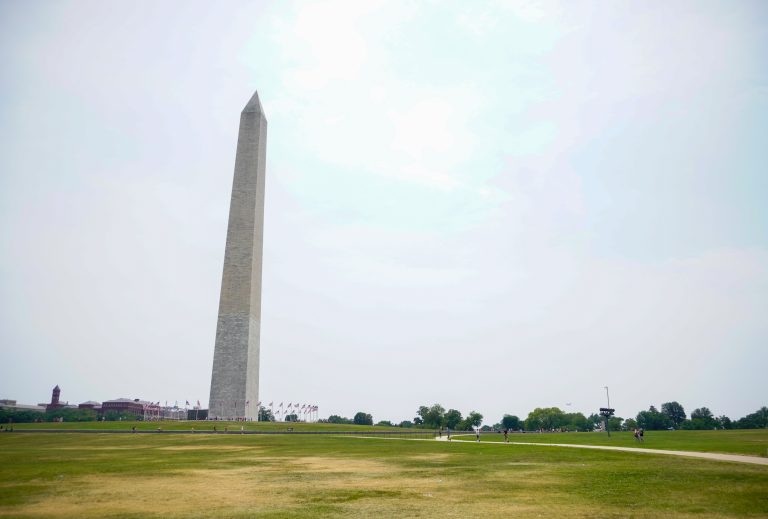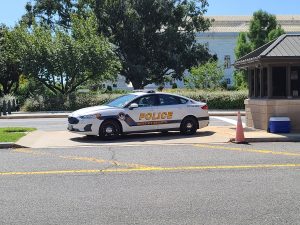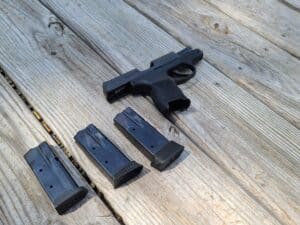A lawsuit accusing the nation’s capitol of engaging in discriminatory “stop and frisk” tactics to enforce its strict gun laws can continue.
That’s the ruling Federal District Court Judge Tanya S. Chutkan, an Obama appointee, handed down last week. The class-action suit claims the Gun Recovery Unit (GRU) of the Metropolitan Police Department (MPD) routinely detained and searched residents without probable cause, especially Black men who live in poorer parts of the city. The judge found the plaintiffs presented enough evidence in the case to overcome an attempt by the city to have the case dismissed.
“The court has found that Plaintiffs have adequately alleged that policymakers either knew or should have known of the GRU’s unconstitutional ‘stop and frisk’ practices,” Judge Chutkan wrote in Crudup v. DC.
The ruling is a blow to MPD’s aggressive enforcement of the city’s strict gun laws. It also sets up a legal showdown that could put Washington, DC, alongside cities like New York City and Baltimore, Maryland, that have seen their police departments rocked by scandals surrounding corrupt or unconstitutional enforcement tactics. It may convince city officials to alter their gun restrictions or, at least, how they execute them.
DC has among the strictest gun laws in the country. It bans the possession of any gun that isn’t registered with MPD and any ammunition, except rounds that can be fired by a gun registered to whoever possesses the ammunition. Its gun-carry permit requires 16 hours of gun safety training, among the strictest in the nation, and fingerprinting. Between the application and training process, the process can take upwards of six months and cost several hundred dollars.
The case stems from the arrests of four DC residents. The men, who are all Black and all live in disadvantaged sections of the city, were stopped by police for what their lawyers claim were trumped-up reasons and, despite never giving consent, searched. They were then charged with non-violent gun crimes, such as carrying without a permit.
“MPD, specifically the GRU, has used a systematic practice of violating the rights of residents, particularly minority men of color, with their frisking policies and stopping individuals without probable cause, without any reasonable suspicion of any wrongdoing, just based on what we believe is just the color of their skin and the location of where they reside in the district,” Sweta Patel, one of the plaintiffs’ lawyers, told The Reload. “A lot of the plaintiffs in the case had their cases dismissed in DC Superior Court because the stop was so invalid on its face that the government did not proceed with the cases because they could not justify the stops.”
The suit claims Dalonta Crudup, a 23-year-old Black man, was walking with a backpack slung over one shoulder when GRU officers approached him in an unmarked car. The plainclothes officers exited the vehicle and confronted Crudup after he put the backpack on both shoulders. Despite Crudup not consenting to a search of the bag, the officers searched the backpack after claiming they could hear there was something inside and felt marijuana during a patdown. They found a gun and arrested him.
“Plaintiff Crudup was stopped basically just walking down the street; he was carrying a backpack. They made statements that claimed that he was suspicious because he was switching his backpack from one shoulder to two shoulders and that he backed up to the fence, then that concerned the officers because he was trying to hide his backpack,” Michael Bruckheim, another of the plaintiffs’ lawyers, told The Reload. “In reality, he was simply walking. The officers surrounded him and forced him back, kind of in a circle where he didn’t have a place to go. He wasn’t free to leave.”
After refusing to accept a plea deal, his case was quickly dismissed.
Bruckheim said the four men had their freedoms severely restricted before their cases were dismissed. He said three of the plaintiffs were released under “high-intensity supervision,” which required GPS monitoring, drug testing, frequent check-ins with police, and abiding by a curfew. Joevantae Ramsey, the fourth plaintiff, was imprisoned for 119 days before his case was dismissed.
“The police weren’t out actively engaged in stopping crime, they were just targeting individuals who they believe might be committing crimes, and that was solely on the basis of their race,” Bruckheim told The Reload.
Reports from several outside groups provide some evidence for the plaintiffs’ claims. A 2020 National Police Foundation report found Black people were the subject of 87 percent of stops, 91 percent of arrests, and 100 percent of use-of-force incidents by the Narcotics and Specialized Investigations Division between August 2019 and January 2020. The GRU is part of that division. Additionally, WAMU examined records for nearly 500 cases from 2010 to 2015 where gun or ammunition possession was the only charge and found 40 percent were dismissed.
Judge Chutkan found the arrest statistics offered up by plaintiffs were good enough to let the case proceed.
“Here, Plaintiffs have alleged statistics of the type described in Marshall, showing the disparities between MPD’s arrest and stop rates of White individuals versus Black individuals. They allege that ninety-three percent of stop and frisks and eighty-seven percent of non-traffic stops were of Black individuals, Black individuals were disproportionately arrested in ninety percent of census tracts and were arrested at ten times the rate of White individuals, and MPD searches were more likely to be conducted in Wards 7 and 8,” she wrote. “These statistics demonstrate a pattern of behavior from which an unconstitutional policy of discriminatory intent or purpose can be inferred.”
She also ruled plaintiffs can try and recover damages from the city itself because officials appear not to have done enough to address issues with the GRU’s tactics.
“Plaintiffs also claim that they were searched by GRU officers without reasonable suspicion, that the District provided ‘inadequate screening, training and supervision of the GRU,’ and that their injuries are a direct result of that failure to train. Because Plaintiffs have stated predicate Fourth Amendment violations and pleaded sufficient facts to establish that the District knew or should have known that GRU officers routinely violated citizens’ Fourth Amendment rights, Plaintiffs have made out a claim for municipal liability based on failure to train. Therefore, Defendants’ motion to dismiss as to Claim I is denied.”
MPD did not respond to the claims in the lawsuit or Judge Chutkan’s ruling.
“Consistent with current practices, MPD does not comment on pending litigation,” Hugh Carew, an MPD’s Public Information Office officer, told The Reload.
However, department officials previously defended its “stop and frisk” policies. In 2019, then-MPD Chief Peter Newsham tried to differentiate his office’s use of the tactic from that of the NYPD.
“While most stops do not involve a frisk (a protective patdown for weapons), a police officer can conduct a frisk in the District if he or she has reasonable suspicion that the person has a weapon,” he wrote in a letter to The Washington Post. “Police may conduct a stop if they observe someone whom they reasonably believe to be involved in a crime or to be armed with a weapon. Stop and frisks are constitutional, and they are essential in investigating crimes.”
But not everyone in MPD shared his view of how the tactic was used in practice. In 2021, The Appeal published an interview with an anonymous former command-level MPD officer who is highly critical of the GRU’s tactics. He accused the division of disregarding residents’ rights and targeting Black men in poorer sections of the city with legally-questionable tactics to improve their arrest and gun seizure statistics.
“Members of GRU would drive up to an area where multiple people were hanging out, jump out of the truck, and force everyone present to submit to stop and frisk without any articulable reason for being stopped and frisked other than their mere presence at the scene,” the source claimed. “The leadership’s focus on GRU is stat driven. Leadership focuses on how many guns GRU recovers and if an arrest is made with the recovery. There is very little, if any, review of how the gun was recovered or how the arrest was made.”
The source said the situation was driven by a desire to recover as many guns as possible regardless of whether the means of doing so are constitutional or even effective at reducing crime.
At the time, under the leadership of new Chief Robert Contee, MPD told the publication that it had “begun examining the Department’s strategies related to guns and violence.”
“Chief Contee emphasizes a strategic approach aimed at getting the right guns out of the wrong hands in our communities,” Kristen Metzger, deputy director of the department’s communications office, told The Appeal. “MPD has already shifted resources to focus on an intelligence-based policing approach to identify, interdict and interrupt violent offenders within the District.”
An internal memo obtained by The Post that same year featured Narcotics and Special Investigations Division commander John Haines outlining a different philosophy for GRU and the rest of the division.
“No longer are we focused on getting guns,” he wrote. “The focus will be on those that pull the trigger and directly or indirectly harm others.”
But GRU’s critics remain skeptical of the claimed change of heart. The Appeal’s source said he isn’t convinced Chief Contee will follow through on the promises of change.
“I think he’s saying what people want to hear. By saying ‘I’m not saying you’ve done anything wrong, we just need to change everything,’ he’s toeing the line, he’s telling [the officers] ‘I got your back,'” he told the publication.
Bruckheim warned that if the aggressive enforcement isn’t changed, the situation will only get worse for DC’s Black residents.
“This isn’t policing based on an active, honest policy of reasonable suspicion, it’s policing that’s based on the lack of reasonable suspicion, and it’s specifically targeting African-American citizens in the District of Columbia,” Bruckheim told The Reload. “If it’s allowed to run rampant because there’s nothing to stop them from just simply stopping any African-American individual they see who’s just outside.”






